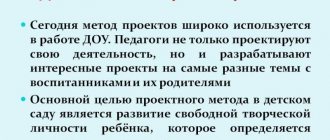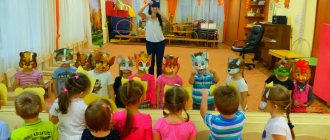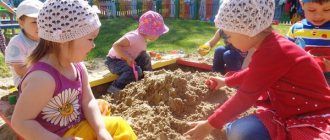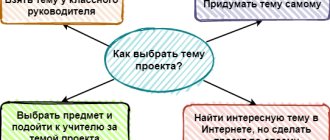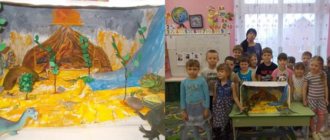Stages of project activity
Depending on age, the following stages of the formation and development of this type of activity in preschool children can be distinguished:
- 3.5 – 4.5 years – imitative-performing period. At this age, children are focused on repeating the actions of adults and imitating them. Their independence and manifestations of initiative are at the stage of formation, so they participate in projects in secondary roles as teacher assistants.
- 5 – 6 years – developmental stage. At this time, preschoolers can already participate in the process on an equal basis with adults, are able to delegate tasks, take on team functions, and are able to fairly objectively evaluate their own work or the results of other children.
- 6–7 years is a creative period when preschoolers are active and show personal initiative, can concentrate on a task and focus on achieving long-term goals.
If a teacher chooses project-based activities as the topic of his self-education, he must take into account the age characteristics of the students.
Types of projects
By type of activity, all projects can be divided into the following:
- Creative and research, the fruits of which are stands, showcases, wall newspapers, posters and so on. The teacher’s design and research activities in this case are aimed at developing children’s ability to experiment.
- Information projects are aimed at collecting and analyzing information, transforming it into material objects such as stands or various crafts.
- The use of projects using role-playing game themes allows you to solve the problem using different characters.
The most experienced teachers in this area can give a master class on project activities for educators, which will clearly demonstrate the effectiveness and significance of the method used.
For those who want to create a project according to all the rules
The peculiarities of the pedagogical and educational system in Russia are such that every step we take must be strictly in accordance with the Federal State Educational Standard. Therefore, even such a creative task as writing a project requires compliance with the methodological recommendations of the Ministry.
In order not to search for information for a long time, I suggest “registering” in my favorite online store “UchMag”, since there is absolutely any methodological literature, including excellent manuals on our topic:
- “Projects in preschool educational institutions: practice of teaching children 3-7 years old”;
- “Innovative pedagogical technologies. Project method in preschool educational institutions";
- “Projects in preschool educational institutions: theory and practice of child development”;
- “Projects in preschool educational institutions. Practice of teaching children 3-7 years old. Program for installation via the Internet";
- “Preschool educational institution development program. CD for computer: innovative educational project";
- “Environmental projects in preschool educational institutions. Research activities on walks";
- Offline webinar “Technology for organizing project activities in accordance with the Federal State Educational Standards for Additional Education”.
For teachers of a preschool educational institution, that is, a preschool educational institution, taking into account modern requirements for a preschool teacher, such manuals are simply a treasure. It contains everything that is necessary for competent planning and implementation of teaching activities: how to draw up a project, what to take into account, how to formalize the results, etc.
Types of projects in kindergarten
In the current practice of modern kindergartens, we use the following types of projects:
- Research with a creative bent: the guys find out some information, for example, why snow melts in the spring, and the results are presented in the form of drawings, wall newspapers, staged skits, etc.;
- Creative tasks are also educational in nature, but the results of the research are presented in the form of a theatrical performance, a performance, or a children's party;
- Social and informational: the guys research the subject of the project and draw up the result in the form of a newspaper, folder, poster, installation;
- Role-playing or gaming: children solve a project task using a fairy tale familiar to them, getting used to the roles of the characters, presenting the result of the research in the form of a role-playing plot.
According to the method of project implementation, they are divided into group, individual, intergroup, and complex.
In terms of implementation time, projects can be short-term (one lesson), medium-duration (1-2 lessons) and long-term (the entire academic year or half-year).
It may seem, especially to parents, that these projects are too difficult for preschoolers. But, I repeat, preschoolers are just getting acquainted with this type of activity, preparing for independent research that they will conduct at school.
Have you probably seen foreign films where children are preparing some projects, often making volcanoes, various devices, bringing a pet to school and talking about it? Such types of activities are extremely useful for children, as they broaden their horizons, activate cognitive activity, and reveal creative and scientific abilities.
The name - projects - sounds very serious and pompous to our post-Soviet ears. In fact, for children this is just one type of work that requires research and presentation of the result. Both short-term and long-term projects are designed to increase the child’s self-esteem, since initially the adult is determined to recognize the value of any result of the child’s research.
The point is not to get an ideal research result from a child, say, on the topic of a favorite toy. The point is to instill in him an interest in research and analysis of the processes that occur around us. Arousing curiosity and healthy curiosity in children is the task of children's projects.
